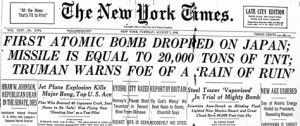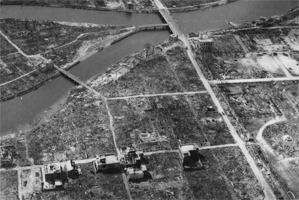 I once asked my grandfather what he had thought about the atomic bomb when the news of Hiroshima broke. I expected him to say he was surprised, and while he was, it wasn’t the surprise I had been expecting.
I once asked my grandfather what he had thought about the atomic bomb when the news of Hiroshima broke. I expected him to say he was surprised, and while he was, it wasn’t the surprise I had been expecting.
You see, he knew the atomic bomb was under development. In fact, most of the people in his office knew, too.
No, he was not working at Los Alamos, nor was he at Oak Ridge or any other Manhattan Project facility. He was an electrical engineer at Bell Labs in New Jersey. His main military effort during the war was for sonar.
So, given how secret the Manhattan Project was, how did he know about it?
It was the sudden silence in the various scientific publications. In the late 1930’s, there had been a steady stream of advances in the study of radioactive materials and how they transformed from one element to another. There were also theoretical hints around nuclear fission and what it could mean. He remembered expecting to read very soon that they had confirmed the splitting of the atom with details about energy output, particle emissions, and so forth.
Instead, there was nothing.
Mind you, my grandfather was not a nuclear scientist. In the day, that was more a sub-specialty of chemistry, but he wasn’t a chemist either. He worked on signal amplifiers and repeaters. In fact, he considered his greatest achievement to be a key development in the repeaters for the transatlantic telegraph lines.
But he read the scientific journals, just like all of his fellow engineers at Bell Labs, and when a lot of big names suddenly went silent, they began to wonder. Calls to various colleagues at universities came back with reports of certain professors and promising grad students going on extended sabbatical to parts unknown.
From an unrelated source, John Campbell of Astounding Stories also knew something was up, and he knew it was in New Mexico. According to the story, he knew this by how many subscriptions had suddenly moved there, and when he started noting the names on those subscriptions, he also put two and two together.
So what had my grandfather been surprised at? He said he was surprised by the reality of how powerful the atomic bomb was. Little Boy exploded as 16 kilotons. Fat Man was all the way up at 21 kilotons. While they had not talked in detail around the office — it was wartime, after all — the general feeling was that fission explosions might be one hundred times as powerful as chemical ones. Some argued for closer to a thousand times as powerful.
They knew high explosive bombs were getting up to one thousand and two thousand pounds, essentially a ton. They knew some of the limits of what the bombing aircraft could carry, and from that they estimated that the fission bombs might reach 500 to 1000 tons, i.e. one kiloton. “Of course,” he said,”we didn’t really know what a kiloton explosion would look like.”
 But they got some idea in July of 1944 when the Port of Chicago (northeast of Oakland, CA) suffered a giant munitions explosion of about 1800 tons of TNT, i.e. 1.8 kilotons. A cousin of my grandfather’s had been one of the few surviving officers of the ship that exploded (the SS E. A. Bryan), and he had only survived by the luck of being on shore leave, visiting his girlfriend in nearby Oakland. Apparently he had felt the explosion through the ground, many miles away and could see the fireball rising over the horizon. But still, the much closer towns of Concord Pittsburg had not been particularly damaged.
But they got some idea in July of 1944 when the Port of Chicago (northeast of Oakland, CA) suffered a giant munitions explosion of about 1800 tons of TNT, i.e. 1.8 kilotons. A cousin of my grandfather’s had been one of the few surviving officers of the ship that exploded (the SS E. A. Bryan), and he had only survived by the luck of being on shore leave, visiting his girlfriend in nearby Oakland. Apparently he had felt the explosion through the ground, many miles away and could see the fireball rising over the horizon. But still, the much closer towns of Concord Pittsburg had not been particularly damaged.
Armed with what knowledge they had, my grandfather had expected fission bombs to be used as super “blockbusters”, and that bombers would blanket an industrial section of a city with five or six of them, possibly expanding to the larger city with another ten or twenty. He said one of his coworkers argued for fewer since the concentrated explosion would generate a more lethal shockwave than the larger pile of TNT had done in the Port Chicago explosion. Even then, it was assumed that a bombing raid would need at least four to ten to be equivalent to a larger TNT-based bombing.
 It never occurred to him that it might be so powerful both in magnitude and in lethality that a single bomb could effectively destroy a mid-sized city. “It made me glad we were out of New York,” he said.
It never occurred to him that it might be so powerful both in magnitude and in lethality that a single bomb could effectively destroy a mid-sized city. “It made me glad we were out of New York,” he said.
The other surprise he confessed was that we had not used it on the Germans. It did not come out until later just how late in the war the bomb was ready, and he had spent much of the war wondering when he was going to see it being used in the European theater. Of course, none of them knew the logistics of gathering the fissionable material nor the design problems of making it work as an explosive, and it was that delay that caused a few of the detractors to suggest that no such effort was being made.
So, looking back on that, I wonder about our own future. If certain key researchers in quantum computing or nanotechnology suddenly went silent, would I know about it? If dark matter and dark energy theorists started disappearing into an Alaskan research institute would you realize it? I’m not one for conspiracy theories, but I have to wonder how many of us would notice if a relatively obscure research field suddenly went dark. Did they simply lose funding, or are we about to be surprised?
